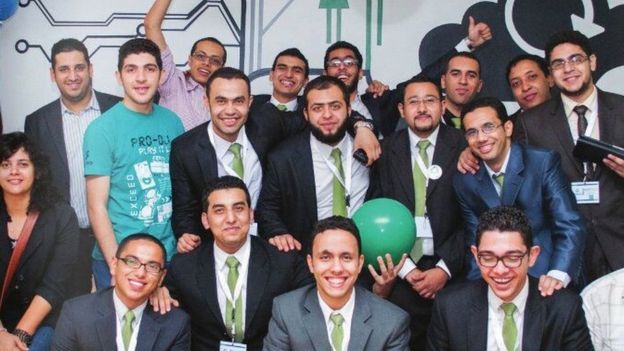RecycloBekia: Giving New Life to Unwanted Electronics in Egypt

By Ghada Ghaleb
Al Hayat
Can recycling e-waste really be profitable? Twenty Tanta University students say yes, as they work to build an electronic waste recycling culture in Egypt with RecycloBekia.
This new cultural and entrepreneurial company is looking to spread its way across Egypt with a single idea: thinking before putting your computers, cell phones, or televisions - no longer of any value - into storage or landfill.
RecycloBekia is the first enterprise concerned solely with the collection of electronic waste in Egypt. The company offers green recycling and safe date destruction to combat the hazards of electronic waste along with conserving natural resources.
Tanta University students are the masterminds behind RecycloBekia. They were able to turn their novel idea into a viable business plan after winning the first prize in a contest organized by Injaz Egypt - a program that supports start-ups by promoting financial literacy skills and entrepreneurial mind sets.
The idea stemmed from the fact that Egypt overlooks the need for an e-waste management system to protect the environment.
“Most electrical and electronic equipment consists of valuable, recoverable materials, including silver, gold, plastic and copper," Mostafa Hemdan, RecycloBekia CEO, said. "Consequently, recycling these components can save energy and natural resources."
Hemdan explained the disadvantages of piling up electronic waste in landfill sites. “E-waste consists of toxic and hazardous metals, which rot gradually and - eventually - dissolve into the soil."
“This leads to contaminated water and food, or even worse, some are burned causing pollutant air emissions."
As a result of the absence of electronic recycling factories in Egypt, the company collects, dismantles, filters and sorts the electronic waste, but then ships it off to factories in Germany to be recycled.
With seed capital of only $1,000, the young team grew quickly from their Tanta roots, to open a new office in Cairo and tap into the unexplored market for e-waste recycling. Their model involves multiple revenue streams, beginning with a focus on Egypt's corporations, some of whom are more than happy to become clients, says Mohamed Sehsah, Public Relations and Media Manager for RecycloBekia.
“The process of picking up the waste usually initiates with a form request being filled out on our website by one of the local organizations, determining the exact amount of waste they want to get rid of,” Hemdan explained.
Then, RecycloBekia sends its own pick-up cars for free along with offering a “green partner” certificate. Sometimes, if the waste quantity given by an organization is large, RecycloBekia pays for it in return.
Mobinil, Orange, Intel, Oracle, and ExxonMobil are among the organizations that have been added to a list of green companies who have made positive steps towards helping the environment by joining RecycloBekia.
However, RecycloBekia’s entry into the Egyptian start-up scene has not been without obstacles.
“The country's unstable political situation has taken its toll on the company since our launch in 2011 coincided with the outbreak of the 25 January revolution,” Nahla al-Shami, CRM executive of RecycloBekia, said.
“Normally, foreign countries don’t welcome the idea of making deals on importing e-waste from a country already suffering from deteriorating economic circumstances.”
The team members also worked through other challenges, which they put in a lot of effort to overcome.
By June 2013, Recyclobekia had closed deal with a German investment firm, but a month later this was called off after the Egyptian military overthrew former Egyptian President Mohamed Morsi.
"Media reports said that roads were closed by the army and terrorists were out in the streets... it was a disaster for us,” Mr Hemdan said.
"By the end of 2013, we had lost most of the investment we had received."
This political turmoil, together with the fluctuations in the gold price had brought the company to the brink of collapse, but the entrepreneur weathered the storm by seeking alternative partners across the Atlantic, where Wisconsin-based Dynamic Recycling offered better payment terms.
Mr Hemdan is now planning to expand this business across the Middle East.
The entrepreneur has also joined forces with African online retailer Jumia to allow individuals to trade their electronic waste for vouchers to buy products.
“We aim to make a quantum leap in the culture of e-waste recycling among the people of the region through launching awareness campaigns in clubs, schools, universities, and exhibitions and encouraging them to give up their unused electronic devices for a good cause,” Shami said.
RecycloBekia plans to take electronics recycling to the next level in the near future. “Opening up the first electronic recycling factory in the Middle East and North Africa region is one of our aspirations that would establish a long-term plan for reviving the economy, and open doors to new job opportunities,” Hemdan said confidently.
Con O'Donnell, an angel investor, and co-founder of Egypt's leading entrepreneurial event, RiseUp Summit, says: "Mr Hemdan made the mistake a lot of younger entrepreneurs make and over-extended. However, he didn't fail. He learned."
